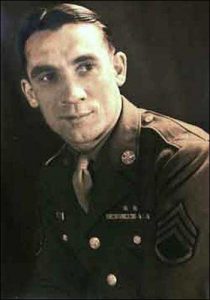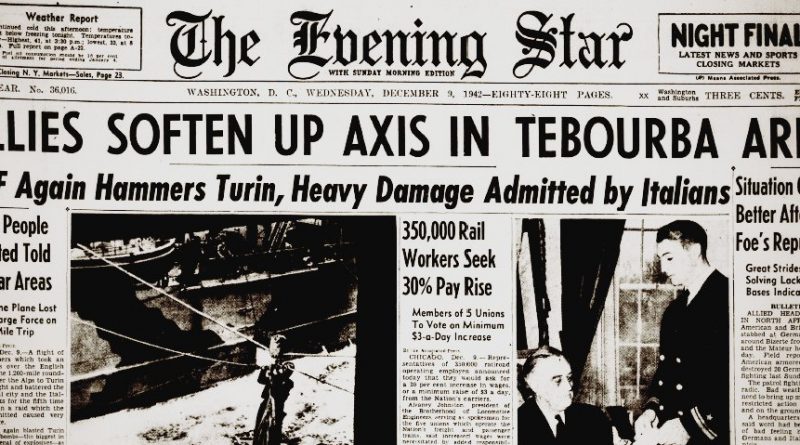World War II Chronicle: December 9, 1942
Click here for TODAY’S NEWSPAPER
Pres. Roosevelt presented posthumous Medals of Honor to two sons of admirals who perished in the Battle of Savo Island (see the front page). Accepting the medals are Lt. (j.g.) Daniel J. Callaghan Jr. and Norman Scott Jr.. Daniel Jr. played football on the 1937 Rose Bowl champion University of California Golden Bears. Callaghan and Scott were classmates at Annapolis (Class of 1911) and Norman Jr. is also a midshipman at the Naval Academy, graduating next year… Meanwhile, Maj. Gen. Alexander M. Patch has relieved Maj. Gen. Alexander A. Vandegrift as commander of the ground forces on Guadalcanal. After four months of combat the 1st Marine Division has begun to ship out of Guadalcanal for recuperation on Australia…

One Japanese-American citizen has been killed and several others are wounded after a riot at the Manzanar War Relocation Center. Manzanar is one of 10 internment camps and sits near Independence, Calif…. Occasionally we will see announcements where D.C. area residents are hearing that their family member is now a captive of the Japanese after being the surrender at Bataan earlier this year, like Maj. Johnny N. Shanks (see page seven). Another prisoner is Mario G. “Motts” Tonelli. The son of Italian immigrants played fullback for the Notre Dame Fighting Irish in the 1930s and a season of pro ball with the Chicago Cardinals in 1940. He enlisted in the Army1 and was shipped off to the Philippines. While on the Bataan Death March a Japanese soldier ordered him to give over his Notre Dame ring. Moments later, a Japanese officer asked Tonelli — in English — if that was his ring. The officer handed it back and said he had been a student at USC and remembered Tonelli scoring the game-winning touchdown against them. Between the death march, hell ships, tropical diseases, and starvation, he lost over 100 pounds during his 42 months of captivity. Het managed to improve enough to actually return to the Cardinals for a game against the Packers in 1945, despite only having only recovered about half of the weight he lost. Next season he played for the All-America Football Conference’s Chicago Rockets…
Page 38 discusses the varying degrees of accuracy to war communiques of the varying powers. The article points out that if you added up the Soviet reports, they claim to have killed 15 million German soldiers. Absurd, considering their estimate is roughly twice the amount of Germans serving in all branches of their armed forces… Sports section begins on page 58, featuring a picture of Georgia’s Frank Sinkwich accepting the John W. Heisman Trophy. Sinkwich has joined the Marine Corps, as has Heisman runner-up, Columbia University’s “Pitchin’ Paul” Governali. He will have to wait until after the war to get his statue, as the war effort needs the 25 pounds of brass required to make the statue more than Downtown Athletic Club…
Who did fans think were the best baseball players of all-time 80 years ago? Page 39 features a list generated by baseball writers:
- First base — Lou Gehrig, Yankees.
- Second base — Eddie Collins, Athletics.
- Third base — Pie Traynor, Pirates.
- Shop stop — Honus Wagner, Pirates.
- Outfield — Babe Ruth, Yankees.
- Outfield — Ty Cobb, Tigers.
- Outfield — Tris Speaker, Indians.
- Catcher — Bill Dickey, Yankees.
- Pitcher — Walter Johnson, Senators.
At this stage, there are only 27 people in the Hall of Fame. Members include Ty Cobb, Walter Johnson, Christy Mathewson, Babe Ruth, and Honus Wagner (Class of 1936); Morgan Bulkeley, Ban Johnson, Nap Lajoie, Connie Mack, John McGraw, Tris Speaker, George Wright, and Cy Young (1937); Pete Alexander, Alexander Cartwright, and Henry Chadwick (1938); Cap Anson, Eddie Collins, Charlie Comiskey, Candy Cummings, Buck Ewing, Lou Gehrig, Willie Keeler, Old Hoss Radbourn, George Sisler, and Al Spalding (1939). Rogers Hornsby, who retired five years ago, was inducted this year.
Roving Reporter by Ernie Pyle
WITH THE AMERICAN FORCES IN ALGERIA — The American forces are welcome in North Africa. Oran gave a terrific demonstration for them.
The first thing into the city after the original few days of fighting was a tank. It pulled up and stopped in the city square. A vast throng gathered around, and the people didn’t know whether the tank was French, British, American, or what. They were bewildered by the suddenness of it all.
Finally an officer stuck his head out of the turret and somebody yelled and asked his nationality. The officer couldn’t understand French, and said something in English. The crowd recognized his American accent, and then the cheering started. Women kissed him, and the crowd almost carried him away. He went around for hours with lipstick all over his face.
Soldiers who came in the first party say the town was almost deliriously happy over the Americans’ arrival. They analyze the feeling about as follows: 40 per cent of the demonstration was based on the Frenchman’s love for show, for cheering anything that passes; 20 per cent was due to the farseeing knowledge that this eventually meant the liberation of France; and another 40 per cent was based on personal and bodily gratitude at the prospect of getting something to eat again.
The Germans had stripped North Africa of everything. Foodstuffs went across the Mediterranean to France and on to Germany. The people here actually were in a pitiful condition. They were starving. The American occupation naturally stopped this flow to Germany. Our soldiers say that within a week they could see the effects. Food produced here in this fertile country now stays here. Further, our Army is donating huge food stocks to the city. The people are gradually starting to eat more.
Americans, notoriously, are often foolishly generous. The troops in the first wave came ashore with only canned field rations carried on their backs, yet our soldiers gave much of this to the pitiful-looking Arab children. The result was that pretty soon the soldiers themselves hadn’t much left to eat, so they lived for days on oranges.
In England, oranges are practically unknown, so here we’ve gorged ourselves on oranges. Some troops have eaten so many that they got diarrhea and broke out in a rash. I can buy tiny tangerines, very juicy, to carry around in my pockets. They cost a franc each, about one and a third cents.
We have all been equipped with foreign-issue American money. The smallest denomination, a dollar bill, looks just like our regular money except for a yellow stamp. This money is accepted everywhere, but you get your change in francs. The exchange is 75 francs to a dollar.
Prices already have started up, but still are cheap according to our standards. Good wine costs only 44 francs a bottle. However, wine is about the only thing left to buy. Stores have pitifully small stocks. Restaurants have horse meat on the menu.
Oran is a big city. It reminds me very much of Lisbon. There are modern office buildings and beautiful apartment buildings of six and eight stories. The Renault auto showrooms downtown were full of brand-new cars when the Army arrived. In a few days the Army had bought every car, and in a few more days the Red Cross had taken over and turned the showroom into a club for troops. Soldiers now stand around the piano and sing “The White Cliffs of Dover.”
Some of our soldiers speak French, but not many. Every French dictionary in Oran has been sold, but the Americans have no inhibitions, and get along on pidgin French and loud shouting.
As soon as the Americans came, the stores began pasting shatter-tape on the windows, for they knew that German bombing probably would follow. It is interesting to see the difference between French and British temperament displayed in the way windows are taped. In England the taping is in very conventional patterns, but here it is a work of art. Designs often are so intricate that they resemble the fantasies of a snowflake under a microscope. One store worked its name into a design; another made the tape into a framework for a dozen pictures hanging in the window.
There have been German planes over since we came. There was much shooting from the ground, but no damage has been done yet.
Oran is not blacked out. It is dimmed out, but not really very dim. When planes come over, all the lights are turned out. Also, the Army has ringed the city with smoke pots. When these are set off, they create what seems to be a heavy fog, which is very effective for hiding the city.
1: See page 44 of the July 10, 1941 Chronicle
Evening star. (Washington, D.C.), 9 December 1942. Chronicling America: Historic American Newspapers. Lib. of Congress.
https://chroniclingamerica.loc.gov/lccn/sn83045462/1942-12-09/ed-1/
